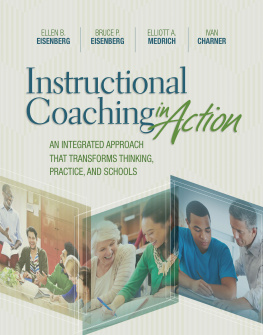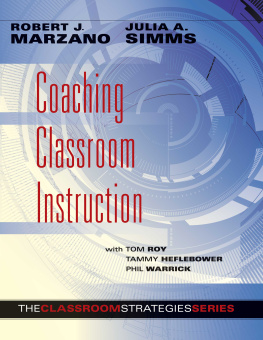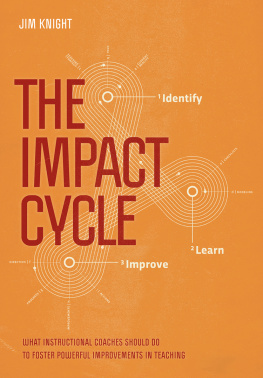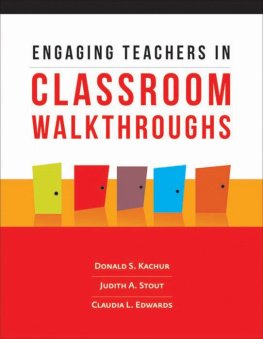Introduction
....................
Ensuring student success requires a new kind of teaching, conducted by teachers who understand learning and pedagogy, who can respond to the needs of their students and the demands of their disciplines, and who can develop strong connections between students' experiences and the goals of the curriculum. Efforts to improve student achievement can succeed only by building the capacity of teachers to improve their instructional practice and the capacity of school systems to promote teacher learning.
Linda Darling-Hammond, Professional Learning in the Learning Profession
We all agree: students need great teachers. There is much less agreement, however, on exactly what a great teacher is or how to make certain that every teacher is great or that every student is taught by a great teacher. After all, what do we mean by "great"?
Currently, many policymakers argue that too many teachers are poorly prepared for the challenge of the classroom. For this and other reasons, they say, schools are unable to provide a quality education to all children.
In fact, we can promote teacher learning now and make certain that teachers have the opportunity to explore and learn new practices, grow on the job, and deliver better instruction to their students. In particular, we believe that our model, educator-centered instructional coaching (ECIC), can help change the teaching dynamic in schools and classrooms. We may need to do many things to ensure that every student has a great teacher, but at least we can start by changing the way we think about professional development and professional learning. To improve student outcomes, we need to transform the way we think about teaching, learning, and how to help teachers grow as professionals. To improve instructional practice, we must recognize that not every teacher is an expert on teaching methods, pedagogy, and subject matter content, but most are eager and committed to doing their jobs well. The challenge is to make changes in schools that offer teachers the support that will help them meet their teaching and student learning goals.
Fundamentally, educator-centered instructional coaching is based on an abiding respect for teachers and school leaders as professionals who are always interested in improving their practice. Our framework appreciates everyone as a learner and a member of a community of practice. It is not designed to bail out troubled teachers or troubled schools. It is not intended to meet one-time needs of teachers or school leaders. It is a commitment that supports the sustainable changes in practice that help teachers and school leaders redefine their goals for schoolwide improvement and puts effective practices in place that transform teaching and learning over the long term.
Why Our Educator-Centered Instructional Coaching Model Is Unique
All models of coaching share some common elements, and some aspects of our framework are certainly familiar to those who have explored the theory and practice of coaching. That said, the following points summarize the distinguishing features of our model:
- Our framework recognizes that coaching is an increasingly accepted practice in schools, and we promote the valued role of coaching as a way of delivering job-embedded professional development. Our framework focuses on helping teachers and school leaders improve instructional practice in ways that have an impact on student engagement and student learning.
- The key to our framework, the BDA (before-during-after) cycle of consultation, makes professional learning collaborative and helps coaches address the needs of teachers and school leaders in a way that is confidential and nonevaluative. Those who are coached set the agenda. The framework promotes a change of culture. It recognizes and respects the professionalthe teacher or school leaderas the source of engagement. It is not about "fixing" anyone; it is about building people's capacity on their own terms through a collaborative process, in one-on-one or small-group settings.
- Embedded in adult-learning theory, ECIC emphasizes four key interdependent areas of practice: (1) applying evidence-based literacy practices; (2) focusing on data collection and analysis; (3) promoting nonevaluative, confidential collaboration and reflection; and (4) supporting coaches through mentoring. These practices are the centerpiece of one-on-one and small-group support throughout the BDA cycle. Although these practices are not unique, their continual presence distinguishes our coaching model from others. Every time a coach meets with a teacher, evidence-based literacy practices designed to improve instruction are a focal point, as are collecting, analyzing, and applying data, and a structured, nonevaluative effort at reflection.
Instructional coaching can help teachers change the teaching and learning equation. At this timewhen practitioners are more aware than ever of how much needs to be done within classrooms and schools to improve the quality of teachingaltering professional support of teaching is crucial for schoolwide improvement. Some seek the transformation of teacher education and induction programs. Eventually those efforts will make an impact. Realistically, however, if we want to see improvements for this generation of students, we will need to boost the skills of a large percentage of the 3.5 million teachers working in our schools today (U.S. Department of Education, 2016). Teachers need a professional learning lifeline now.
Our Journey
This book is the product of practice and experience over many years. In 2005, the Annenberg Foundation and the Pennsylvania Department of Education partnered to develop a statewide system of instructional coaching. The objective of the collaboration was to prepare and support coaches who provide job-embedded professional development for teachers on building their instructional practice and pedagogical skills.
In 2010, the Annenberg Foundation and the Pennsylvania Department of Education extended the project, and the Pennsylvania Institute for Instructional Coaching (PIIC) began supporting coaches through regional education agencies called intermediate units (IUs) across Pennsylvania. At this time, 25 of the state's 29 regional agencies participate, and many hundreds of instructional coaches are implementing the PIIC model of educator-centered instructional coaching and consistent professional development in their school communities.
This continuing relationship and investment has convinced school leaders around the state that PIIC's approach substantially helps teachers improve their instructional practices and strengthens school cultures that embrace continuous improvement. Our work is no longer limited to Pennsylvania. Today, coaches, administrators, and others interested in the transformation of teaching and learning in all 50 states and 30-plus countries use resources we provide through our websites and blogs (PIIC, 2016).
The educator-centered instructional coaching model, designed by PIIC, evolved over a six-year period. PIIC also provides ongoing professional development to instructional coaches on four core elements: one-on-one and small-group support; evidence-based literacy practices applied across all content areas; data collection, analysis, and application; and nonevaluative reflection on practiceall provided by coaches to teachers and other school leaders. PIIC-trained instructional coaches offer teachers tools and support to help them improve their practice and deliver quality instruction. As part of their training, PIIC coaches are also supported by mentors who receive ongoing professional development to bolster their own skills.












